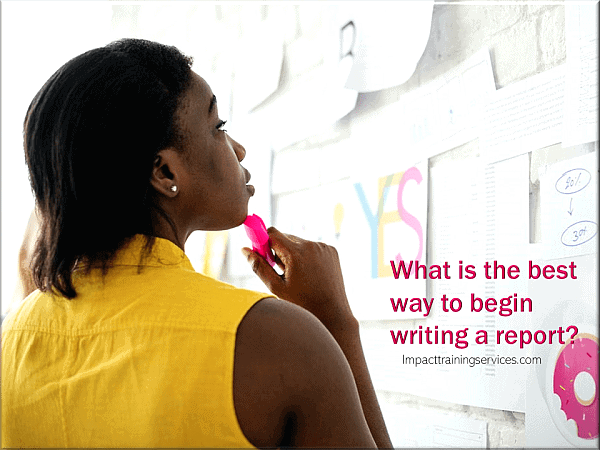Last Updated on April 19, 2024 by Lorna Barrow

So what’s your approach to begin writing a report?
Is it something like this?
You sit at your computer and type a few sentences.
Then you delete them.
Next you type a few more, read them over carefully, all the time wishing that they made more sense.
The next thing you know, the deadline for the report is here and you have barely started.
How do I know this?
I have been there….too many times.
But if you are in business, you will have to write reports, proposals, etc, at some level, sooner or later.
And asking yourself “Where do I begin writing this stupid as2 report???” is not the best place to start either.
As you will see shortly, the best way to begin is by preparing for the process – even before you write a single word.
There are 4 no-fail steps in this process but before we get to them let’s be clear on the following:
What is a report?
A report is an account of some event, situation, project, etc, which usually provides information which the writer obtains through research, investigation or observation.
The key thing to note is that it is prepared for others to take some kind of action, mostly to make a decision or follow some recommendations.
There are many types of reports: financial, progress, project, research, case study, proposal, health and safety, workplace accidents, useless, full-of-it and the list goes on…
You should begin any report by preparing for the process, even the last 2 mentioned above.
Why does report writing matter?
The best way to explain this is to compare academic writing and professional writing.
With Academic Writing, giving or sharing information may be enough. After all, in most academic writing you are trying to ‘show how much you know’ on a particular subject.
You are therefore writing to demonstrate your knowledge to experts who will (or may not) validate that knowledge.
A thesis for a university degree is a good example of this.
In Professional Writing, YOU are the expert.
That’s why, report writing falls under professional writing.
For example, in business, when you are the one with the best knowledge of a problem, situation or customers, you are the expert. Your conclusions, recommendations or opinions matter.
Therefore, nearly every time you write a business report some action will be taken, some change will take place.
That’s why report writing matters!
The 4 proven steps in preparing for the report writing process
Depending on the nature of your report, the process may be short or long.
But whatever the length of the process it includes the following 4 steps:
1. Get clear about what you’re reporting on
2. Identify the objectives/purpose of your report
3. Identify and assess the user(s)
4. Determine what data you will have to collect
Mastering these steps will improve your overall writing skills and add another tool to your business toolbox.
So let’s discuss them in detail.
1. Get clear about what you’re reporting on
Sometimes we start out intending or being requested to write a report on a very vague topic – for example “The habits of human beings.”
Say what? A single human being can have thousands of habits!
When this happens, if you have been asked to write the report by someone else (for example, an organisation you represent) find out exactly what they want.
If you have decided to write the report on your own, get clear on what you’re reporting on.
Here’s why this is important.
Let’s say you decide to write a report on the best way to slice bread so that a slice has only one side.
So you begin your research and in the process, you discover some interesting but not related information about baking pans.
If you’re not clear on what you’re reporting on, you can find yourself placing a greater emphasis on the baking pans, thereby burning the bread in the process. (pun intended)
2. Get clear on the objectives/purpose of your report
If you are writing the report for an organisation or someone else, and you’re lucky, here’s what will happen.
You will be given clear terms of reference, they will have a specified format for writing a report and the purpose will be obvious and valid.
And you will get this information, even before you begin writing the report.
On the other hand, when your luck is average (like the rest of us), it’s common for you to be required to write reports with only a vague idea as to what is actually needed.
There is no stated ‘brief’ or specification and you’re expected to be nothing short of brilliant.
Moreover, many leaders don’t or (can’t) write a decent report themselves, (Yes! I said that!) which makes them even less likely to be able to explain to you what they need from your report.
So what happens next?
You spend the next how-many-ever days agonizing over what the report should include, what it should look like and how long it should be.
Don’t put yourself through that!
You can’t read minds, so ask for clarification. It’s the most sensible and logical thing to do.
Ask the person who requested the report, exactly what is its purpose and if they have an ideal format in mind.
You can also ask any other questions you think will help you, including “is this report really necessary?”
Of course, if you’re not the boss, that question works best when you have already identified your next career move!
And what about when you decide to write a report on your own initiative?
The process still holds true.
Following on from #1 above, you have to be very clear about the purpose for writing your report.
You must know that it’s to effectively communicate to small bakeries that producing a slice of bread with only one side, will improve their bottom line.
3. Identify and assess the user(s)
Always remember that you’re writing the report for users and readers other than yourself.
Too often, we users are presented with mountains of paper and thousands of full-sized words, morphed into something called a report.
We approach it guardedly, knowing from experience, this will be another load of the writer’s favorite bovine feces which we now have to read.
We begin hopefully, but pretty soon we give up in frustration and hold the report safely in our hands, while looking longingly at the paper shredder.
Dear Report Writer, before you write a single word, do try to identify and assess the readers/users of your report.
Here are some questions you can ask yourself about your audience to help you write them a meaningful report:
- Who will use the report?
- Why do they want it?
- What specific action will be taken because of this report?
- What is the education level or background of the user?
- How will the document be used?
- What is their level of experience on the topic?
- What is their job role?
- Any other questions which I left out which you can think of…
When you identify the users in this way, you are already determining the style and tone of your report.
4. Determine what data you will have to collect
At this point, you are clear what you are reporting on.
You are also clear on the purpose of the report and you have attempted to identify and assess your users.
Whew! You can now determine what data you will have to collect.
This should be easy because you will now collect the data which:
- supports the purpose of the report (decision-making/problem-solving)
- expands the understanding of the user
- helps to clarify your findings
- adds to the existing information about the topic of the report
When you make the four points above the basis of your data-collecting, you will collect data which is exactly relevant to the purpose of any report you’re writing.
Are you ready to begin writing a report?
There you have it…the 4 steps to begin your report writing.
Notice that you begin writing a report not by starting to write, but by preparing for the process of PRODUCING a report.
This is the most important step in writing a report. Trust me, once you have mastered the first step, the others will be so much easier.
Now I know you’re curious about the other steps in the process, so let me give you all 7 of them:
1. Prepare for the Process
2. Collect the Data
3. Analyse and interpret the data
4. Plan your Report
5. Write Intelligently
6. Produce the first full draft
7. Complete and handover the report
So…I’ve broken down the first step for you.
I’ve share the other 6 with you.
Are you ready to write reports that will hit your target every time? No?
Then contact me, I’ll be happy to help…
To your report writing success…




